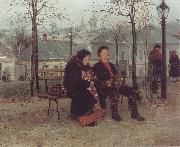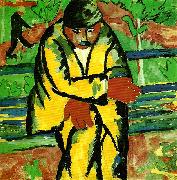Wholesale Oil Painting No Minimum |
|||||||||||
|
|
|||||||||||

|
|||||||||||
|
|
|
||||||||
Makovsky, VladimirRussian, 1846-1920 Painter, brother of Konstantin Makovsky. He studied at the Moscow School of Painting, Sculpture and Architecture from 1861 to 1866 under Sergey Zaryanko and other artists. From 1872 Makovsky was a member of the WANDERERS (Peredvizhniki). In his early pictures, Makovsky usually portrayed contemporary manners and morals in a spirit of gentle irony, as in the Lovers of Nightingales (1872-3; Moscow, Tret'yakov Gal.). Such works reveal Makovsky's skill in defining precisely and carefully the role of each figure in the scene. In the mid-1870s Makovksy began to concentrate on the central theme of most of his subsequent work: the glaring social contrasts of Russian life. |
||||||||
|
|
||||||||
On the Boulevard
On the Boulevard Painting ID:: 35142 |
mk100
1886-1887
Oil on canvas
53x68cm
mk100 1886-1887 Oil on canvas 53x68cm |
|||||||
|
|
||||||||
Kazimir Malevich1878-1935 Russian painter, printmaker, decorative artist and writer of Ukranian birth. One of the pioneers of abstract art, Malevich was a central figure in a succession of avant-garde movements during the period of the Russian revolutions of 1905 and 1917 and immediately after. The style of severe geometric abstraction with which he is most closely associated, SUPREMATISM, was a leading force in the development of CONSTRUCTIVISM, the repercussions of which continued to be felt throughout the 20th century. His work was suppressed in Soviet Russia in the 1930s and remained little known during the following two decades. The reassessment of his reputation in the West from the mid-1950s was matched by the renewed influence of his work on the paintings of Ad Reinhardt and on developments |
||||||||
|
|
||||||||
|
|
on the boulevard
on the boulevard Painting ID:: 68728 |
1911, gouache on paper 72x71.
stedelijk museum, amsterdam
se 1911, gouache on paper 72x71. stedelijk museum, amsterdam se |
||||||
|
|
||||||||
|
Kazimir Malevich 1878-1935 Russian painter, printmaker, decorative artist and writer of Ukranian birth. One of the pioneers of abstract art, Malevich was a central figure in a succession of avant-garde movements during the period of the Russian revolutions of 1905 and 1917 and immediately after. The style of severe geometric abstraction with which he is most closely associated, SUPREMATISM, was a leading force in the development of CONSTRUCTIVISM, the repercussions of which continued to be felt throughout the 20th century. His work was suppressed in Soviet Russia in the 1930s and remained little known during the following two decades. The reassessment of his reputation in the West from the mid-1950s was matched by the renewed influence of his work on the paintings of Ad Reinhardt and on developments on the boulevard 1911, gouache on paper 72x71. stedelijk museum, amsterdam se |
||||||||
|
|
||||||||
|
Prev Next
|
||||||||
|
|
||||||||
|
Related Paintings to Kazimir Malevich :. |
||||||||
|
|
||||||||
|
CONTACT US |


